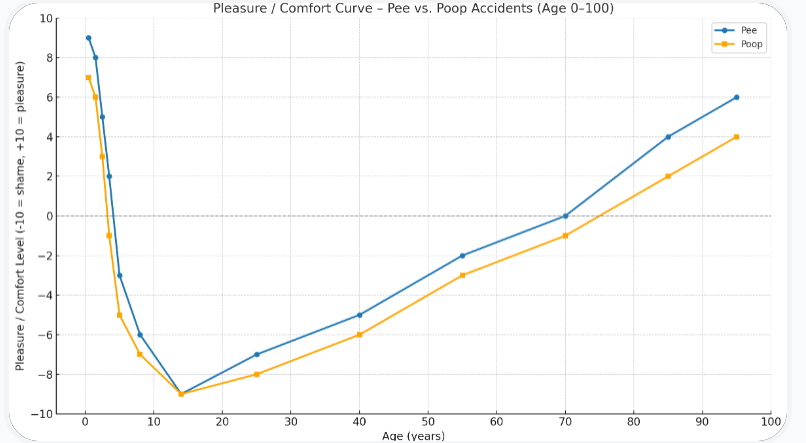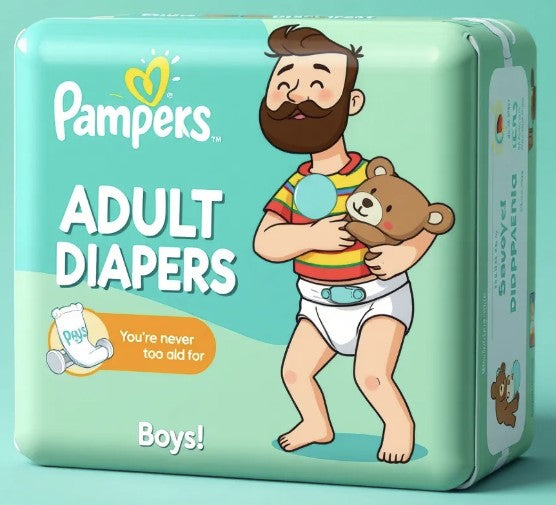
Peeing / Pooping yourself pleasure Curve
Share
The Circle of Comfort: From Diapers to Letting Go..
When You’re a Baby
Warmth Without Shame
When you’re a baby, there’s no such thing as being clean or dirty. Your body simply does what it needs to do. Pee and poop happen without effort or judgment, and you barely notice. All you feel is the warm, gentle softness inside your diaper. It doesn’t hurt. It doesn’t bother you. Sometimes, that little release even helps you drift into sleep, and peace follows.
The First Awareness
Wetness Isn’t “Bad”
As you start to grow, maybe around one year old, you begin to notice things. You feel when it’s wet. You notice when it’s warm. But it isn’t bad. It’s just a sensation. Your diaper remains a place where things happen naturally. It holds you and keeps you safe. You are allowed to be exactly as you are.
Two and a Half: Comfort Meets Expectation
Big Girl Words, Soft Diaper World
At two or two and a half, people start talking about being a big girl and trying the potty. Expectations arrive, but the diaper is still there—still comforting and soft. I remember it clearly: at two and a half, I liked being in a diaper. My mom would put one on me for shopping, and it didn’t bother me at all to poop in it. I felt warm, calm, and safe. Why stop playing or walking or holding my mom’s hand just to sit somewhere cold and boring?
Four Years Old: Pride and Its Fragility
Control and the World of Play
By four, you start to say, “I’m big now.” You wear underwear and use the toilet. Pride grows, but it is fragile. The connection to your body isn’t lost. I remember playing with my Playmobil toys, completely absorbed, and pooping my pants without even realizing it. Strangely, I felt proud for staying inside my world and doing what my body needed. My parents were less impressed and put me back in diapers at night for a while.
School Age: The Birth of Shame
Rules, Laughter, and Silence
At five or six, shame appears. You’re among other kids. You hear adults say “yuck” or notice when someone has an accident. Rules become clear: you don’t pee or poop your pants anymore. So you learn to hold it. You clench, cross your legs, and stay quiet. Sometimes a quiet, hidden accident happens—a few drops, a brief warmth, a racing heart. If no one notices, you sit still and wait for it to dry, feeling fear and a small, confusing relief. You never speak of it.
Teenage Years: Clean at All Costs
A Body That Still Remembers
As a teenager, you want to seem mature and in control. Even farting in front of others feels unthinkable, let alone an accident. Yet the body doesn’t follow social rules. It cares about tension and release. You may not have accidents, but sensations remain. You might pee in the shower or in the ocean, and for a few seconds remember something warm and simple. Then it passes, and you move on.
Adult Years: Control with Surprises
Meetings, Road Trips, and Small Leaks
In your twenties, thirties, and forties, you plan bathroom breaks and hold it like an adult. But sometimes life reminds you of the body’s timing: a long meeting, a car ride, a run, or a fit of laughter. A few drops escape and panic arrives. You clamp down, pretend it didn’t happen, and carry on. Your body remembers, though. It always does.
Middle Age: The Subtle Return
Softening, Not Failing
In your fifties and sixties, you may feel changes. Little leaks happen more often. At first you blame stress, coffee, or a rough week. But your body isn’t betraying you; it’s being honest—tired, slower, softer. You might wear a pad or a pull-up “just in case.” Shame arrives, but so does relief. It isn’t comfortable to hold all the time. Sometimes, letting go simply feels better.
Later Years: Gentle Acceptance
Safety, Warmth, Familiarity
In your seventies and eighties, clenching may lose its appeal. Some people fight it, others don’t. Diapers can feel safe and familiar. In care homes, some ask not to be changed right away. “Leave me. It’s warm. I’m fine.” For them, it isn’t giving up; it’s choosing comfort and peace.
The Last Stage: Full Circle
Softness, Warmth, Peace
In your nineties and beyond, words fade but sensations stay. Softness, warmth, safety. You live in a body that doesn’t ask you to perform. You might wet yourself and not notice—or notice and not mind. You are not a burden. You are simply a person, living in a body, feeling, releasing, resting. The shame is gone. Comfort remains.
FAQ
Is it normal to feel comfort after a small accident?
Yes. Warmth and relief are natural bodily signals. Feeling comfort for a moment does not define you and is more common than people admit.
Why do little leaks happen more with age?
Pelvic floor changes, hormones, childbirth, surgery, and bladder irritants can all increase urgency and leaks over time.
Is it okay for adults to wear pads or pull-ups?
Yes. Discreet protection is a practical choice for comfort and hygiene during travel, long events, or when leaks are unpredictable.
How can I handle shame around incontinence?
Normalize the experience, prepare with the right products, schedule bathroom breaks, and seek professional guidance if needed.
Can stress, caffeine, or exercise make urgency worse?
Yes. Stress and certain foods and drinks can heighten urgency. Balancing hydration and timing breaks can reduce surprises.
When should I speak to a doctor?
If leaks are frequent or sudden, disturb sleep, or come with pain, burning, or blood, consult a healthcare professional.
Does ABDL Hypnosis work ?
If you want to try ABDL Hypnosis to enjoy more and more peeing and pooping yourself it is a very good solution and we are here to help you doing that ;)
